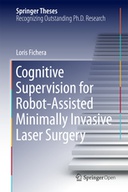Explore

Cognitive Supervision for Robot-Assisted Minimally Invasive Laser Surgery
Loris Fichera
2016
This thesis lays the groundwork for the automatic supervision of the laser incision process, which aims to complement surgeons’ perception of the state of tissues and enhance their control over laser incisions. The research problem is formulated as the estimation of variables that are representative of the state of tissues during laser cutting. Prior research in this area leveraged numerical computation methods that bear a high computational cost and are not straightforward to use in a surgical setting. This book proposes a novel solution to this problem, using models inspired by the ability of experienced surgeons to perform precise and clean laser cutting. It shows that these new models, which were extracted from experimental data using statistical learning techniques, are straightforward to use in a surgical setup, allowing greater precision in laser-based surgical procedures.
This book is included in DOAB.
Why read this book? Have your say.
You must be logged in to comment.
Rights Information
Are you the author or publisher of this work? If so, you can claim it as yours by registering as an Unglue.it rights holder.Downloads
- 19 - pdf (None) at Google Books.
- 96 - pdf (CC BY-NC) at OAPEN Library.
- 80 - mobi (CC BY-NC) at Unglue.it.
- 66 - pdf (CC BY-NC) at Unglue.it.
- 95 - epub (CC BY-NC) at Unglue.it.
Keywords
- Biomedical engineering
- Cognitive Surgical Robotics
- Computer-assisted Surgery
- Laser-tissue Interaction
- Medical equipment & techniques
- medicine
- Medicine: General Issues
- Minimal Thermal Damage
- minimally invasive surgery
- Models of Laser Ablation
- Robotic Laser Microsurgery
- Robotics and Automation
- thema EDItEUR::M Medicine and Nursing::MB Medicine: general issues::MBG Medical equipment and techniques
- Thermal Laser-tissue Interactions
- Transoral Laser Microsurgery
- User Interfaces and Human Computer Interaction
Links
DOI: 10.1007/978-3-319-30330-7web: https://link.springer.com/book/10.1007/978-3-319-30330-7
Editions


